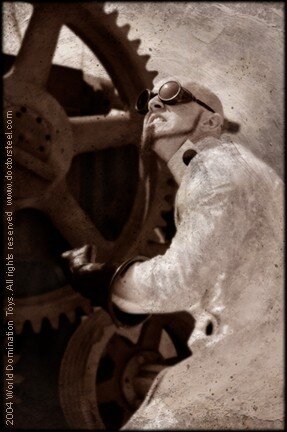The Island of Doctor Freudinstein

I’ve always thought that the scariest thing about Victor Frankenstein is the fact that he isn’t unrealistic enough.
I’ve always thought that the scariest thing about Victor Frankenstein is the fact that he isn’t unrealistic enough.
As I write this, I’m in the middle of reading two books. One is The Denial of Death by Ernest Becker, which is an in-depth exploration of the psychology of the fear dying, although since the book was published in the 1970’s modern psychology has evolved in very different ways than Becker imagined. The other is The Encyclopedia of Monsters by Jeff Rovin, an immense tome which catalogues hundreds of the greatest monsters of mythology, film and literature, although since the book was published in the 1980’s, a modern reader would note some very important gaps. One might not think that these two books would have very much in common beyond the fact that, reading them in 2016, both seem hilariously out of date. The two books do share one major commonality, though, and it just happens to be very relevant to every storyteller and gamer out there. Whether it’s Becker discussing psychoanalysis and the evolution of Sigmund Freud’s theories of mental health, or Rovin describing Doctor “No First Name” Moreau or Matthew “Frankenstein” Logan, both books again and again drive home the point that bad things happen when a scientist stops considering that their theories could be wrong. Pretty much the biggest mistake any thinker can commit is to become excessively convinced of the truth of their own pet theory.
I hardly have to list fictional examples of scientists whose obsessional belief that they were right led to problems for the people around them. It’s one of the oldest and most over-used clichés in science fiction and anyone reading them can likely name fifteen or twenty examples in under a minute. It is, unfortunately, a common occurrence in real scientists, since even though the very first principle of the scientific method is “always be open to evidence that you might be wrong,” we all have a tendency to become strongly attached to our beliefs and to resist changing them. When an average person becomes overly attached to beliefs, you “merely” get problems like systemic racism, vaccine denialism, and “witches” being burned at the stake. When prominent researchers and thinkers make the same mistake, you get paradigms that become enshrined as “truth” to the exclusion of other ideas… which also tends to lead to things like systemic racism and folks being burned at the stake, and causes no end of trouble.
In a beautiful illustration of this, Denial of Death quotes, from the autobiography of Carl Jung, a conversation which Jung had with Freud in 1910. Freud said to him, “…promise me never to abandon the sexual theory. That is the most essential thing of all. You see, we must make a dogma of it, an unshakable bulwark.” Although we know that Freud himself questioned many of his own beliefs, moments like this illustrate how he made an active decision to forbid others from questioning him or deviating from his teachings. Other thinkers who proposed modifications to Freud’s theories often faced mockery and exclusion rather than intelligent discussion, and in turn, this led to the different schools of analytic thought becoming hostile and argumentative towards in other for many years. Only in the last few decades has it been possible for many of the different branches of psychiatry to collaborate well, and this has unsurprisingly led to an explosion of creative thought and advances in psychotherapy. Of course, we can’t necessarily blame Freud for his insistence on dogmatic thought; at the time, he was fighting, not against other scientific approaches, but a rising tide of “occultism” and quackery that dominated medicine in his era, but the (probably) unintended consequence was a generation of students who were just as inflexible and sectarian as any religious body.
The villains in our games, then, have an unfortunate tendency to be art imitating life. The obsessive mad scientist or cackling wizard is an exaggeration, to be sure, but probably not nearly the stretch we might like to think they are. These figures hit home with us because, over the top as they might be, we see how they parallel some of the most prominent figures in history, to say nothing of our teachers, the members of our family, and of course, ourselves. Everybody wants to believe that their beliefs are right, and that makes everybody kind of scary when you think about it.
More than four years ago, Dr. Eris Lis, M.D., began writing a series of brilliant and informative posts on RPGs through the eyes of a medical professional, and this is the one that appeared here on May 28, 2016. Lis is a physician, gamer, and author of the Skirmisher Publishing LLC OGL sourcebook Insults & Injuries, which is also available for the Pathfinder RPG system.






